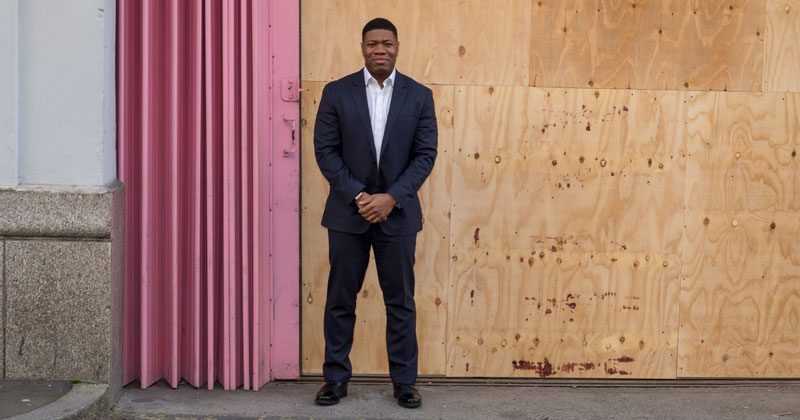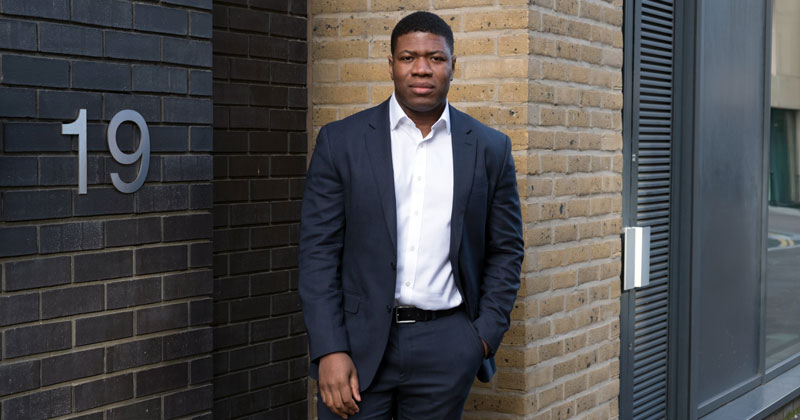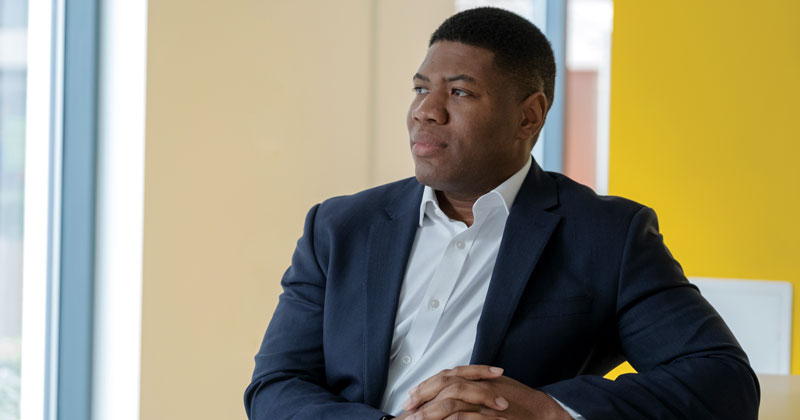Looked-after children have poor educational outcomes. Only one in seven achieve five GCSEs at A*-C – compared with one in two who are not looked after – and just six per cent go on to higher education.
The stats for those growing up in children’s homes are even more stark: one in 25 for the five A*-C standard and just one per cent for HE.
Even when special educational needs are factored in (looked-after children are significantly more likely to have SEN), they still make far less progress than their peers.
The department for education purveys attendance as some kind of magic bullet for pupil performance, but even if it’s a necessary condition, it’s obviously not sufficient. Looked-after children have better-than-average school attendance and they’re still falling behind.
Emmanuel Akpan-Inwang, once a foster child himself and now a TeachFirst ambassador, is out to change this through his social enterprise Lighthouse, which will found and run children’s homes with a strong focus on education.
Expectations of children who grow up in care, particularly those in children’s homes, are far too low
“I think expectations of children who grow up in care, particularly those in children’s homes, are far too low,” he says.
Such outcomes are not inevitable, as he discovered on his travels to Germany and Denmark to research the widely-used “social pedagogy’” approach to residential care.
Under this model, well trained staff are employed to build relationships, create a home-like environment, and engage young people as equals in activities such as cooking dinner together. The staff, who are university educated for at least three years, are trained in understanding the interrelationships between physical, emotional, social and cognitive wellbeing – for example, how emotional problems can impact cognitive development.
“Social pedagogy in many ways is seen as educational in a much broader sense,” he explains, “and encompasses essentially everything that you consider to be involved in the raising of a child.”
The 31-year-old plans to create a supportive learning environment by staffing his children’s homes with graduates, who will offer homework help in the evenings, take the young people on weekend outings, and maintain close relationships with schools. Basically, “if you can think of the best that a family would be able to offer to a child in terms of support with homework, that’s what we want to provide”.

Akpan-Inwang believes that transposing the social pedagogy model into children’s homes in England will not only improve educational outcomes, but that he’ll be able do it without charging a penny more than the private providers that currently run most of our children’s homes (with an average bill of around £180,000 per child per year) and still be able to reinvest the surplus into training and salaries.
His project is supported by a social business called Catch22, whose offices – swarming with employees and start-ups – host our meeting. This citrus-themed, glass-fronted office building in east London gives no hint of the company’s 200-year history of enacting social transformation, which he relates to me with obvious pride.
Akpan-Inwang spent the early years of his life in care and attributes many of the opportunities he’s had in life to the stability his foster parents were able to offer.
“The great thing about foster parents is that they’re often able to offer something that is needed at a crucial time. And I think what was needed right then was for somebody to have my wellbeing and safety as a concern,” he suggests.
There isn’t much public discussion or discourse about the outcomes of looked-after children
Children tend to be placed in residential care only when other options, such as fostering, have been exhausted. “What you find is, with children who end up in children’s homes – which is where they essentially go when they can’t go anywhere else – they will have had multiple foster breakdowns or foster placements.”
Because children in residential care tend to move around a lot (83 per cent will be in their children’s home for less than a year before they’re shunted somewhere else), their education can be regularly interrupted as they wait to get accepted into a new school.
“What we’re trying to do with a new type of home is actually make sure that education is right at the top of the list of priorities,” he says. Lighthouse will work with local authorities to identify supportive schools where the children can start straight away.
“For those children, because they enter adulthood so early, because of the fact that they move into independence so early, their education becomes even more important,” he stresses, “and we feel we have a model that’s going to support that.”

While the government is aware of the problems with the current system, “there isn’t much public discussion or discourse about the outcomes of looked-after children. And that’s one of the reasons why we have some of the worst outcomes for looked-after children in western Europe.”
Having moved around a lot during early childhood, Akpan-Inwang was placed back with his parents in east London for most of primary school then went on to attend his local comprehensive, Morpeth Secondary School, followed by Havering FE college, where he studied history, sociology, media studies and English literature at A-level.
“I think I was I was lucky to have a number of teachers who believed in my ability to do well, and encouraged me to do that,” he says. “I wasn’t always a great pupil at school, my teachers would probably say my first two years were potentially quite challenging, but they stuck with it. They really encouraged me to work as hard as I possibly could. And when I went to college, it was basically my tutor who saw my potential to go and study at an elite university.”
All teachers need to be considering the mental health of looked-after children
At the London School of Economics he encountered an entirely new social milieu: “I realised that my education pattern was quite different from the people who I was friends with, obviously with many of them coming from private and public schools.”
“I felt I was very lucky,” he recalls. “So when it came to the end of my time I thought I wanted to do something to give back, and I came across the Teach First programme, and so decided to apply.”
He spent three years teaching English in a school in the west Midlands, before leaving to “take on something that was quite close to my heart, which was children who are looked after.”
The Teach First ambassador network has been vital in getting his project off the ground. He’s taken practices from Jamie’s Farm – a project that aims to reduce exclusions through residential stays on a farm – and has worked closely with charter-inspired Reach Academy Feltham, an “attachment-aware school” also founded by Teach First ambassadors, which has produced outstanding academic results.
The launch of Lighthouse coincides with a growing awareness of the need for greater support for looked-after children in schools. The latest DfE guidance for the “designated teacher” in each school has just been beefed up – this person must now “understand the impact trauma, attachment disorder and other mental-health issues can have on looked-after and previously looked-after children and their ability to engage in learning”.

If this seems like another case of government dumping more responsibilities on teachers, Akpan-Inwang’s take is slightly different. Given over half of looked-after children have some level of emotional and mental health problem, rising to 72 per cent for those in residential care, he sees it as merely “a step in the right direction”.
“I think all teachers need to be considering the mental health of looked-after children – in everything from educational support plans or planning lessons,” he suggests.
We have taken inspiration from looking at the sort of provision that boarding schools would put in place through sports and music and cultural activities
He references a recent evaluation of “attachment-aware schools” by the Oxford Rees Centre, which found that when teachers had been trained in spotting the signs of attachment disorder – a condition in which individuals have difficulty forming lasting relationships and do not learn to trust – they became calmer and more nurturing, and there is a noticeable impact on pupil behaviour.
Keeping parents in the equation is also crucial to young people’s development. “What we want to do is encourage parents to come along to parents’ evenings to hear about what the children are doing, to maintain constant contact with us, so that we’re all involved in the raising of that child.”

Lighthouse staff would maintain regular contact with teachers. “They could give us a call if they have had a really tricky day with the young person. And we would do extracurricular activities and trips, and really make that a great part of the home,” he says.
“We have taken inspiration from looking at the sort of provision that boarding schools would put in place through sports and music and cultural activities that really help to enhance the formal education that children are receiving.”
He plans to employ only university graduates, which is far higher than the required minimum standard for working in residential settings. Employees must have the level three diploma in residential childcare within two years of starting work in a children’s home.

“A lot of people start it in the sixth month,” he explains, “but that sector has high turnover. So a lot of people will come in, work for a while, maybe start but not complete the course.”
Prestige and pay are key to addressing high turnover, he says, both of which he intends to address.
The final challenge now lies in finding the right local authority to partner with for the first home, and so far, it’s not proving easy. They will have to understand social pedagogy, and “the fact that we are going to prioritise education being really important, and that when we say that we’re therapeutic, we’re quite serious about it”.
Lighthouse also wants to work “hand in hand with local authorities rather than just providing a service which they purchase”, he insists.
He believes it will ultimately save them money by being a more sustainable model that operates “on a long-term basis, to really radically change the outcomes for the young people”.
On that note, he has just won a fellowship, which means he’ll be able to spend even more time more time in residential children’s homes in Denmark and Germany this summer, “really closely observing the practices and methods, and looking in detail at the training for social pedagogues, as well as really understanding in detail what really exceptional children’s homes look like”.
The fellowship is funded by the Winston Churchill memorial trust, which supports people to “travel overseas in pursuit of new and better ways of tackling a wide range of the current challenges facing the UK”.
It sounds like the perfect match.
It’s a personal thing
What’s your favourite book?
One book that I would definitely recommend people read is Thinking fast and slow by Daniel Kahneman. It’s a really good way of understanding how and why people think, really getting an idea as to how your brain works. It had a massive impact on my teaching.
What’s your favourite place you’ve ever been?
Probably the souks in Marrakech. I went there when I was a student – I just loved listening to people bartering and having a go at it myself. I found that I was relatively okay at it, and I got a good deal on a Moroccan carpet!
What message would you put on a billboard?
“Work hard, be nice.”
What do you do to relax?
I go to the gym and do weight training.
What’s your retirement dream?
It would probably just be supporting looked-after children in some way, maybe just volunteering or supporting the education of vulnerable people. My lifelong interest is education so it would be in some way connected to that. I can’t really imagine clocking off at 65 and lying on a beach somewhere.














Your thoughts